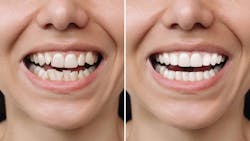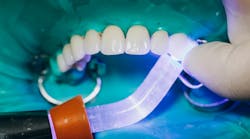Concerning "Turkey teeth" veneers still trending, posing dangers to patient health worldwide
"Turkey teeth" refers to a branch of medical tourism in which dental patients seeking a full set of veneers fly to Turkey in order to get the procedure done cheaply—and sometimes under the table.1 But as the popularity and normalization of cosmetic procedures continue to rise, particularly among Gen Z,2 more patients than ever are risking both their health and safety for the sake of esthetic "tweakments."
Why Turkey?
Turkey is one of the top countries for cosmetic procedures internationally, according to data from a 2024 Global Survey Report. Patients fly to Turkey for their veneers due to their cost-effectiveness, ability to receive an entirely new set of teeth quickly, and a chance to tie a mini-vacation into their stay. In fact, the number of patients from the UK traveling to Turkey for dental work between 2019 and 2022 rose by 60%. On average, procedures done in Turkey are 50%–70% cheaper.3
The term "Turkey teeth" also denotes the esthetic look of many of the veneers (or full crowns marketed as veneers) done at clinics in the country. Often, patients receive a noticeably white and artificial-looking smile—a set of teeth that feels more one-size-fits-all than something more natural and designed with the patient's unique mouth shape in mind.
Although the market for veneers largely consists of people ages 40 to 51,4 younger people are showing an increased interest in the procedure. The rise of "Instagram face," social media influencers, and the ubiquitous presence of beautifying filters has largely impacted Gen Z's relationship with cosmetic procedures.2
As the Turkey teeth trend progresses, young people are increasingly putting themselves at risk for complications and a lifetime of dental difficulties—especially when they are shaving down their perfectly healthy teeth in the process.
The dangers of Turkey teeth
Going to an unlicensed dental professional or seemingly-reputable clinic can lead to serious, sometimes irriversable damage, including the following:
-
Severe pain and discomfort from from nerve damage, ill-fitting crowns that affect the bite, or infections
-
Infections and abscesses due to poor hygiene standards or rushed procedures
-
Crowns and veneers falling off due to poor bonding or an improper fit1
An aspect of many veneers done cheaply in other countries is the aggressive full prep done to a patient's mouth. Often, their teeth are whittled down to thin, shark tooth-like nubs. Unlike a minimal- or no-prep approach, this type of excessive shaving removes much of the tooth's integrity, decreases veneer survival rate, and makes revision much more difficult as there is little enamel left for a dentist to work with.
A 2022 analysis in Clinical Oral Investigation examined the longevity of conventional and minimally invasive veneers over a nine-year period. Researchers noted the survival rate was 9.67% for conventional veneers and 100% for no-prep or minimal prep veneers, with 10 complete failings occuring out of the 35 total participants.5
Veneers that are improperly installed can also lead to plaque buildup, inflammation around the gum line, and even gum decay. Furthermore, those seeking cheap veneers overseas may be compounding their financial burden as correcting a botched procedure is expensive—not to mention the maintenance that comes with replacing their veneers every 10 to 15 years.2
Cosmetic work affecting soldiers' oral health
Social media influencers and members of Gen Z aren't the only ones flying to Turkey for a new set of teeth; the British army has recently warned their troops against the dangers of international veneers as this procedure could render them medically unfit for deployment.6
Lieutenant Colonel Wassim Slim told Soldier magazine: "Of those who had to manage problems relating to cosmetic surgery abroad, the majority deemed the quality of care as poor or very poor."
The array of oral health complications Turkey teeth can cause poses a serious threat to recruitment, especially as troop numbers continue to steadily decline. Additionally, many army dentists have reported correcting poor overseas cosmetic work—173 recruits were rejected over the past four years because of gum disease and rotting teeth according to data from Oral Health Group.6
Keeping patients safe and the dangers of medical tourism
It's important to talk to patients who are interested in veneers about ways to have this procedure done safely, with a licensed and reputable provider. Ask them what their esthetic goals are, how much they know about the process and maintenance of veneers, and what barriers may make them hesitant to move forward. If they have financial concerns, make them aware of the cost of upkeep and longevity before they commit to something so permanent. Consider asking them why they think dentistry is so expensive compared to other things they buy. Introducing more conservative, alternative solutions like tooth whitening or composite bonding may be helpful as well.
Building a relationship with patients is key to successful outcomes; many issues arising from dental and cosmetic tourism stem from the lack of a relationship between patient and provider. If a patient is flying out for a limited window of time, they are compounding what would be an otherwise longer process—cramming their consultation and their procedure together over a weekend prevents overseas providers from tailoring their approach to the individual. And if a patient experiences complications after they've already flown home, they cannot easily contact or see the same clinic for a revision. Language barriers may also hinder proper communication and lead to incongruent esthetic goals.7
Overall, it's important to ensure patients considering this procedure are properly educated on the risks of Turkey teeth and the long-term consequences of investing in a permanent procedure like veneers.
References
-
Gurhan A. Turkey teeth: Everything you need to know about. Maltepe Dental Clinic. August 25, 2025. https://www.maltepedentalclinic.com/blog/turkey-teeth/
-
Prabhakar M. The viral veneer trend: Why gen-z is reshaping their smiles. OnlyMyHealth. August 22, 2025. https://www.onlymyhealth.com/viral-veener-trend-what-is-it-and-why-genz-is-reshaping-their-smiles-doctor-tells-12977835410
-
Turkey dental statistics (2025). UK Smiles. August 13, 2025. https://www.uksmiles.co.uk/turkey-dental-statistics
-
Veneer statistics (2025). Impressions Dental. https://impressionsdental.com/blog/veneers-statistics-2025/
-
Smielak B, Armata O, Bojar W. A prospective comparative analysis of the survival rates of conventional vs no-prep/minimally invasive veneers over a mean period of 9 years. Clin Oral Investig. 2022 ;26(3):3049-3059. doi:10.1007/s00784-021-04289-6
-
Army warns troops against 'Turkey teeth' amid rising dental concerns. Oral Health Group. November 4, 2025. https://www.oralhealthgroup.com/dental-governance-regulations/army-warns-troops-against-turkey-teeth-amid-rising-dental-fitness-concerns-1003991611/
-
Medical tourism: Travel to another country for medical care. Centers for Disease Control and Prevention. https://wwwnc.cdc.gov/travel/page/medical-tourism
About the Author

Sarah Butkovic, MA, BA
Sarah Butkovic, MA, BA, is an Associate Editor at Endeavor Business Media, where she works on creating and editing engaging and informative content for today's leading online dentistry publications. She holds a Master's English Language and Literature from Loyola University Chicago and is passionate about producing high-quality content that educates, inspires, and connects with readers.

